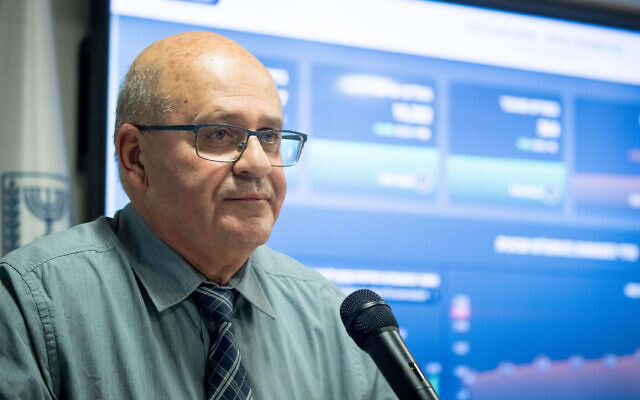Israel could soon be returning to a full national lockdown for more than a month amid skyrocketing coronavirus infection rates, according to reports citing comments made Tuesday night in a videoconference with top Health Ministry officials and hospital chiefs.
Health Ministry Director-General Chezy Levy said in the call that if a lockdown is approved, it will last for at least a month due to the current high morbidity rate, according to leaks from the call carried by Channel 12 and Ynet.
It was the first time a time-frame has been given for a potential lockdown, which will be discussed during a meeting Thursday of the so-called coronavirus cabinet.
A source told Ynet that if there is a lockdown, there must first be a detailed and gradual strategy for lifting it to avoid repeating the costly mistakes in ending the lockdown of March-April.
The report said some officials who took part in the call are convinced the Health Ministry is seeking to impose a general lockdown immediately.
The development came as 40 towns and neighborhoods across the country awoke after their first overnight curfew, ordered by the government in an effort to slow the virus spread in areas with high infection rates. However, those measures largely went unenforced and are seen by many as ineffective.

Health Ministry Director-General Chezy Levy during a press conference in Jerusalem about the coronavirus on July 13, 2020. (Yonatan Sindel/Flash90)
Directors of various hospitals who participated in the Zoom call described the difficult situation they are facing, with patients flooding coronavirus wards and staff getting increasingly frustrated and overworked.
The Health Ministry officials were “shocked” to hear those descriptions, Ynet quoted an unnamed participant as saying.
One of the participants, Dr. Michael Halberthal, the director of Haifa’s Rambam Medical Center, told Channel 12 Wednesday that Israel must implement a full lockdown.
He said the “traffic light” program for localized restrictions pushed by coronavirus czar Ronni Gamzu “was good four or five weeks ago had it been implemented properly, but in its current form it has been neutered in multiple ways. It is up for negotiations and isn’t implemented. It is completely amorphous.”
Halberthal said that during the upcoming High Holiday period, people must only celebrate with their nuclear families, like during Passover in April. “Otherwise, we won’t be able to control the situation.”
“We have been in this COVID-19 reality for seven months now, the teams are working very hard,” he said. “The phase of getting cheers from the public is over. We are facing ever-growing demands. Our challenge is substantial, and the staff is getting extremely overworked. The shockwaves are affecting the entire hospital.”

Michael Halberthal, director-general of Rambam Health Care Campus (courtesy of Rambam Health Care Campus)
The Health Ministry said Wednesday that there were at least 3,506 new coronavirus infections diagnosed on Tuesday, in one of the highest figures for fresh cases detected in Israel in a 24-hour period.
The number, published mid-morning Wednesday by the Health Ministry, was just short of the record for daily cases, set the day before at 3,514. It took the total number of active patients past 30,000 for the first time.
There were 30,366 active patients in the country with COVID-19, the disease caused by the coronavirus. Of those, 472 were in serious condition, with 140 on ventilators. The death toll rose to 1,048 after five people died since midnight Tuesday. Ten people died during the day before.
Participants of Tuesday night’s Zoom call were presented with analysis saying that at the current rate, it will take at least 90 days to cut daily infections to 400.
“That is very worrying,” an unnamed official told Ynet. “There don’t seem to be effective steps to curb deaths and serious cases, and the ability of the health care system to adequately treat patients is already stretched very close to the limit.
“We are facing severe exhaustion among medical staff, and each hospital is missing dozens or hundreds of staff members due to quarantine,” he said.

Border Police seen at the entrance to the East Jerusalem neighborhood of Beit Hanina, as Israel enforces curfew, applied to some 40 cities all over the country which have been badly infected with the coronavirus September 8, 2020. (Olivier Fitoussi/Flash90)
On Tuesday, the cabinet approved evening curfews in dozens of towns and neighborhoods throughout the country. The new rules, which close schools and most businesses, will last for a week before being reconsidered by the cabinet.
The curfew, lasting from 7 p.m. to 5 a.m., targets nightlife activities, from bars and restaurants to the traditional slichot prayer gatherings held ahead of the Rosh Hashanah holiday, which falls on September 18 this year.
Most of the municipalities affected are among the poorest in Israel, with Arab and ultra-Orthodox towns making up much of the list. Some 1.3 million Israelis were covered by the curfew, according to a Channel 12 tally.
Levy, Gamzu, Health Minister Yuli Edelstein and several other senior officials entered quarantine on Tuesday after a staff member in the government’s COVID-19 task force caught the coronavirus, the Health Ministry said.
Related posts:
Views: 0
 RSS Feed
RSS Feed















 September 9th, 2020
September 9th, 2020  Awake Goy
Awake Goy  Posted in
Posted in  Tags:
Tags: 
















